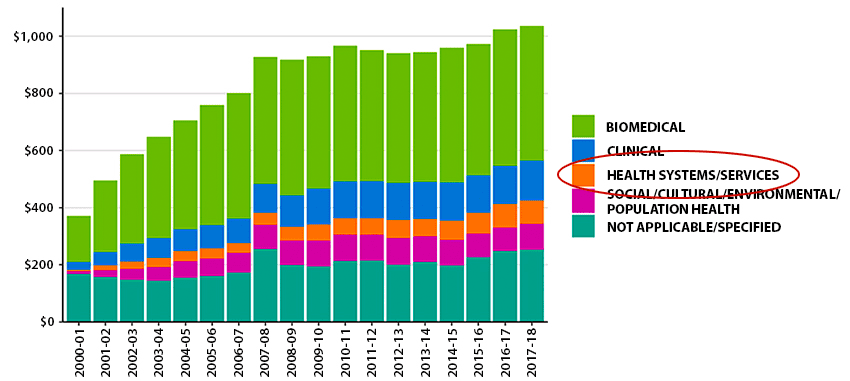We got funded by the Canadian Institutes of Health Research (CIHR) to do health services research! This may not sound like major news, but health services make up a small proportion of CIHR funding (figure 1), and success rates for CIHR funding have been dwindling from 30% in 2005 to a rate below 15% in 2018. According to CIHR, “health services research is a multidisciplinary field of scientific investigation that studies how social factors, financing systems, organizational structures, health technologies, and personal behaviours affect access to health care, the quality and cost of health care, and, ultimately, Canadians’ health and wellbeing”, and “includes the goal of improving the efficiency and effectiveness of health professionals and the health care system, through changes in practice and policy.” So, while a small proportion of CIHR funding, the work of this pillar is of critical importance to the health and wellbeing of Canadians, and has never been more relevant and needed than in our new COVID-19 reality.
Figure 1: CIHR Investments by Primary Theme Over Time (in millions of dollars)
Source: cihr-irsc.gc.ca/e/50218.html
So, we got funded, YAY! But getting funded was not enough this time. Just as we started preparing our research ethics application to begin our “CUP-Study”, to conduct a comparative analysis of centralized waitlist effectiveness, policies, and innovations for connecting unattached patients to primary care providers, the word came – a halt to our research activity until further notice due to advancing COVID-19. We needed to pivot, (a word that had more use in 2020 than in the last 5 years combined, along with “you’re on mute” and “sorry, my kids are running around”), to conduct research that could be carried out safely and included COVID-19 relevance. And we succeeded. Here’s how:
- Deciding to pivot from our CUP to PUPPY study. The decision to pivot was the easiest step. We had important questions to answer, and updating a protocol to include COVID-19 relevance and safe research practices was our only path forward. Anticipating new funding opportunities, I sketched out a plan and reached out to our cross-sectoral team who were critical to our success.
- Building from a strong multi-province team ensured we were able to gather more than 20 letters of support representing over 70 patient, health authority, provincial government, and provider partners, highlighting the strength and relevance of our team when the CIHR COVID-19 Rapid Response grant call emerged. Together we strengthened and added to our CUP protocol, and created the bigger, COVID-19 safe, feasible, and relevant PUPPY-Study (Problems Coordinating and Accessing Primary Care for Attached and Unattached Patients Exacerbated During the COVID-19 Pandemic Year). I am not exaggerating when I say it took a team of us, working through evenings and weekends for 4 weeks to finish our revised protocol.
- Collecting preliminary data with our team members and recording ethnographic field notes within our provinces established emerging COVID-19 priority research questions which we were able to include in our protocol submission.
- Developing a comprehensive multipronged communications strategy. We worked with a communications expert to ensure successful recruitment of participants and rapid sharing of findings.
- Transforming from the CUP to PUPPY study with updated questions and protocols. These included: adding new points of data related to COVID-19 and allied health providers (e.g., pharmacists); extending our timeline to include pre-and during COVID-19 timelines; additional qualitative interviews and development of patient and provider surveys to be administered longitudinally; protocols to collect data and have all study communications and data storage via secure online platforms; incorporation of a comprehensive integrated knowledge translation plan.
BONUS: publicly acknowledging team members’ contributions and celebrating steps along the way, (including Zoom dance parties) helped maintain morale and momentum as we pivoted.
While we were prepared and successful in pivoting to COVID-times, I recognize many great teams were not as fortunate. These are extraordinarily challenging times. Many have lost loved ones, had their research programs halted, are working from home with increased responsibilities, or had to let go of talented research staff. Perhaps the most important lesson emerging from COVID-19, is that the health and wellbeing of all humanity is inescapably linked to how well we support and care for all human beings. My hope is that COVID-19 may lead to greater focus on equity and social determinants of heath, not only in our own backyards, but globally. Health services research and primary healthcare will play a vital role in this. So, let’s fund more of it!!!
To learn more about our PUPPY-Study, please follow and contact us at…
Email: puppy@dal.ca
Twitter: @PUPPY_STUDY
Website: www.emilygardmarshall.ca/puppy

